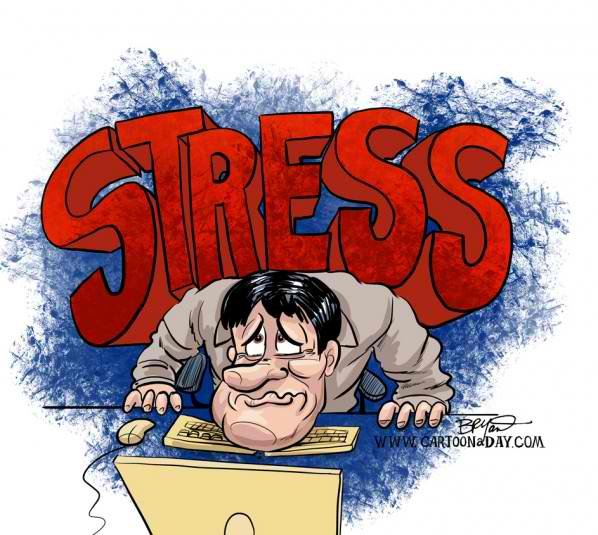
Have you ever been in a situation wherein you could feel your whole body closer to sleeping after hours of putting your body in motion? Or felt like your head and back has been nailed a hundred times? Don’t worry, you’re not alone. You are not the only one experiencing stress.
According to the Merriam-Webster’s Dictionary, ‘stress is the state of mental tension and worry caused by problems on one’s life, work, etc. It is a physical, chemical or emotional factor that causes bodily or mental tension and may be a factor in disease causation’.
On the other hand, according to WebMD, ‘it is the body’s reaction to any change that requires an adjustment or response. When you feel threatened, a chemical reaction occurs in your body that allows you to act in a way to prevent injury. This reaction is known as “fight-or-flight”, or the stress response’.
The effect of stress to the body encompasses the physical, emotional, and mental aspects of a person.
It is a result of many things or events around us that are depressing and demanding to our overall well-being.
Stress could be better understood by its signs and symptoms. Some are easily recognizable such as frequent headaches, pain in the neck, back, or muscles, cold or sweaty hands, and even frequent urination.
However, he effects of stress can either be positive or negative. Positive in a way that it keeps us alert in avoiding danger. It only becomes negative when a person experiences continuous challenges without a relief or relaxation in between. As a result, the person becomes overworked and the stress-related tension builds.
Some of the students here in the School where I pursue my degree are also no stranger to stress at all. With different factors triggering it, it is no doubt that stress is one of our many problems.
But what really stresses the students the most? On the random interview conducted by me, here’s what they have answered.

1.) 58% of the interviewee said school matters have been cranking them up. Such things include hard to accomplish projects and literal mind blowing exams. Moreover, instructors who have “whisper-like voices” while discussing add up to their stress. Terror professors also cause stress to the most of them.

2.) 16% of them have answered family problems contribute much to their stress. One specific case is the lack of communication between them and their parents, which primarily leads to misunderstanding on both sides. One interviewee also said that elder siblings who always nag cause them stress.

3.) 8% of the interviewed students have stated that financial problems stress them. Where to get money to buy projects and to pay for photocopy materials are concrete examples of their case.

4.) 8% have also responded that computer-related matters trigger stress. Certain things that worry them are spending long hours using it for research works, and even defending the village in Clash of Clans (COC) is not an exemption.

5.) 4% of the students answered that time management is stressful. Time allotment for projects and other priorities tend to induce stress to most of them.

6.) 4% also added that their past experiences, especially about their lovelife, also contribute to them being stressed out. With this threatening condition, tips on how to overcome the “stress epidemic” would really come in handy for the students who are working to succeed.
To help reduce stress, Mrs. Esther Arriesgado, a Registered Nurse and currently an instructor and college nurse in the said school, gave her personal solutions in overcoming it.

1.) PLAN YOUR TIME WISELY
Engage in activities one at a time. Try finishing what you started before doing other stuff. This makes things organized, and as a result would give you plenty of time to plan for the next things you’re going to do. Know your priorities!

2.) GIVE YOURSELF A BREAK
Take a rest from time to time. When you know that you are tired from doing things you’ve done, sitting down for a while would help. Resting yourself would give your body a time-out from all the exhaustion. Through this, your mind would be somehow refreshed. Pushing yourself into too much work would result to low quality of output.

3.) EAT PROPER FOOD
Never engage yourself to too much diet. Eating nutritious food would help in the proper functioning of your brain and other body organs. If you work too much, there is likelihood that you will forget to eat, hence worsening the situation.

4.) SLEEP WELL
Having enough sleep would prevent you from getting drained. Sleeping is the only time when you could let your whole body regain all the energy you have wasted from all day’s work. Sleep at least 8 hours every night.

5.) USE YOUR COMPUTER OR GADGETRIES LESS
Draining all yourself on using too much high-tech devices can lead to headache and stress.

6.) LOVE YOUR STUDIES
Once you love something. It will not just let you push yourself to work harder, but it will also give you much pleasure.

7.) HAVE FAITH IN GOD
Don’t forget to always include Him in everything that you do. He will always be there to keep you away from harm and provide you with better well-being. These tips may be challenging to accomplish but if you want to have a stress-free life, it is not bad to consider the abovementioned tips.
Photos sources: Google
PS: Hope you like this article of mine. Please Upvote and don't forget to follow! :) Godbless all
Number 5 is especially important for me and others because if you are a computer worker, you are exposed to tech all day long. Why continue to expose yourself when it is not necessary? Shut them off.